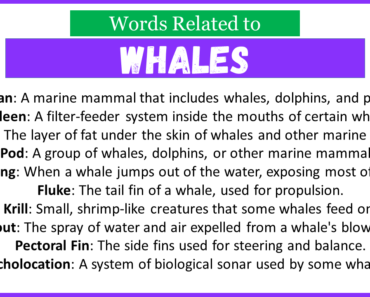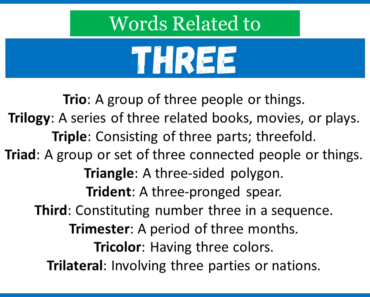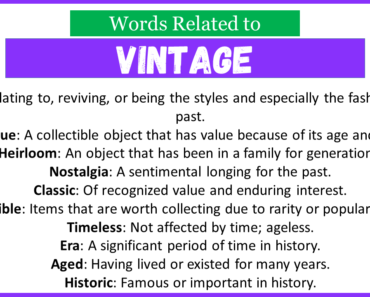Abuse, a grievous social issue, spans various forms and levels of severity. Understanding its multifaceted nature requires familiarizing oneself with the vocabulary surrounding it. Here are the top 100 words related to abuse, each elucidated for clarity.
Words Related to Abuse
Below are the top 100 words related to abuse with meanings.
- Physical: Pertaining to violent actions or harm inflicted upon the body.
- Emotional: Relating to damaging or hurtful manipulation of feelings.
- Sexual: Involving unwanted or coercive sexual actions or advances.
- Neglect: Failure to provide necessary care or attention.
- Manipulation: Deceptive control or influence over someone.
- Exploitation: Using someone unfairly for personal gain or advantage.
- Domestic: Pertaining to abuse occurring within the household or intimate relationship.
- Bullying: Repeated aggressive behavior intended to hurt or intimidate.
- Verbal: Pertaining to harmful words or language.
- Gaslighting: Manipulating someone into doubting their own reality or sanity.
- Coercion: Persuading someone forcefully, against their will.
- Molestation: Unwanted sexual touch or attention.
- Harassment: Persistent and unwanted behavior causing distress.
- Intimidation: Instilling fear or forcing someone into an action.
- Psychological: Pertaining to mental torment or manipulation.
- Trauma: Deeply distressing or disturbing experience.
- Victim: Someone who suffers harm or injustice.
- Perpetrator: One who commits harmful or illegal acts.
- Assault: Physical attack or aggressive action.
- Isolation: Keeping someone away from others to control them.
- Grooming: Preparing a person, often a minor, for sexual abuse.
- Threat: Statement of intent to inflict harm or punishment.
- Enabler: A person who allows or supports harmful behaviors.
- Survivor: A person who endures or recovers from harm.
- Violence: Physical force intended to harm or damage.
- Incest: Sexual activity between family members.
- Stalking: Obsessively following or watching someone.
- Dependency: Relying heavily on something or someone, often drugs or a person.
- Retaliation: Harming someone in response to perceived wrongs.
- Shaming: Making someone feel guilty or embarrassed.
- Blackmail: Threatening to reveal damaging information unless demands are met.
- Boundaries: Limits set to protect personal well-being.
- Control: Dominating or directing someone’s actions or feelings.
- Degrade: To lower in dignity or estimation.
- Rape: Sexual activity without the person’s consent.
- Bystander: A person who witnesses but may not intervene in an event.
- Counseling: Professional guidance to address personal issues.
- Healing: Process of recovering from trauma or hurt.
- Toxic: Harmful or poisonous; often referring to unhealthy relationships.
- Silence: Lack of communication or suppression of voice.
- Disclosure: Act of revealing a secret or truth.
- Suffering: Experiencing pain or distress.
- Recovery: Process of returning to a healthy or normal state.
- Defensive: Protecting oneself from perceived threats.
- Trigger: Something that evokes a strong emotional response.
- Overpower: To subdue or dominate by force.
- Scapegoat: Blaming someone else for one’s own problems.
- Devalue: Reduce or underestimate the worth of someone.
- Cruelty: Enjoyment in causing pain or suffering.
- Suppress: Preventing expression or awareness.
- Invalidation: Discrediting or dismissing someone’s feelings or experiences.
- Economic: Controlling or depriving someone financially.
- Predator: A person who exploits others, especially vulnerably.
- Tyranny: Cruel and oppressive control or use of power.
- Betrayal: Breaking trust or being disloyal.
- Subjugation: Bringing under domination or control.
- Humiliate: Making someone feel ashamed or lowering their dignity.
- Entitlement: Belief in having a right to someone’s submission or goods.
- Consent: Voluntary agreement to something.
- Desensitize: Making less likely to feel shock or distress.
- Hazing: Subjecting someone to humiliating pranks or initiation rites.
- Objectify: Treating someone as an object or without regard to their humanity.
- Dominate: Having power and influence over someone.
- Red flag: A warning sign or cause for concern.
- Repression: Subduing someone or something by force.
- Resistance: The act of opposing or withstanding.
- Alienate: Isolating or estranging someone.
- Victimize: Target someone for harm or exploitation.
- Complicit: Being involved in wrongdoing or unethical activity.
- Tolerance: Accepting or enduring suffering without protest.
- Vulnerable: Being open to harm or attack.
- Retribution: Punishing someone in retaliation.
- Blame: Assigning responsibility for a wrong or mistake.
- Submissive: Ready to conform to another’s authority.
- Belittle: Make someone or something seem unimportant.
- Frighten: To instill fear in someone.
- Captivity: The state of being imprisoned or confined.
- Disempower: To deprive of power or influence.
- Lure: Tempting someone into a trap.
- Narcissism: Excessive self-interest or admiration.
- Unseen: Not observed or noticed.
- Jealousy: Envy towards someone’s advantages or possessions.
- Loyalty: A strong feeling of allegiance.
- Degenerate: Decline in moral qualities.
- Despair: Loss of hope.
- Intervene: To come between disputing parties.
- Outcry: A strong expression of protest.
- Sobriety: The state of being clear-headed and not under the influence.
- Duress: Compulsion by threat or force.
- Vindictive: Seeking revenge or harm.
- Insidious: Proceeding in a subtle, harmful way.
- Minimize: Make something seem smaller or less significant.
- Denial: Refusing to admit or recognize reality.
- Penance: Voluntary self-punishment for wrongdoing.
- Impunity: Exemption from consequences.
- Traumatize: Cause trauma or severe distress.
- Shelter: Place of refuge or protection.
- Desperation: A state of despair, typically leading to rashness.
- Constrain: Compel or restrict forcefully.
- Martyrdom: Enduring pain or suffering for one’s beliefs.
Read Other Related Words:







